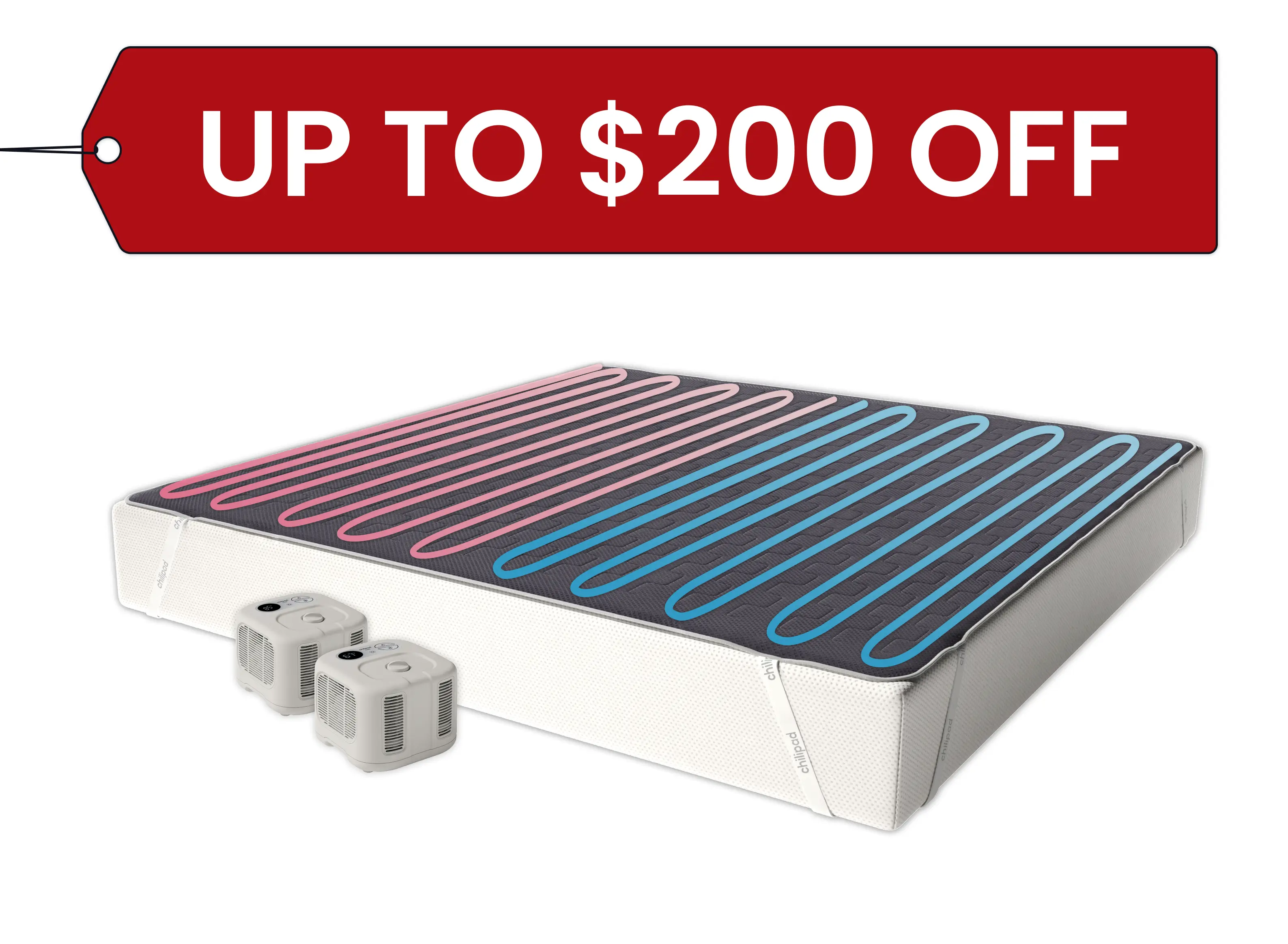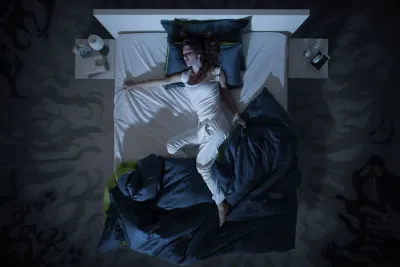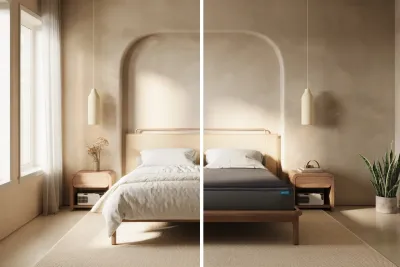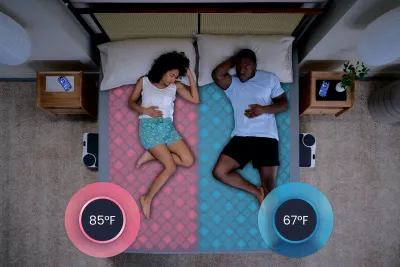
Key Takeaways
- Choose Breathable Nighttime Clothing: Opt for loose-fitting, natural fabrics like cotton, linen, or bamboo to allow for better airflow and wick away sweat, minimizing discomfort during the night.
- Optimize Your Bedroom: Create a cool, dark, and quiet bedroom by adjusting the thermostat, using blackout curtains, and minimizing noise to promote a restful, sweat-free sleep.
- Limit Sweat-Inducing Foods and Drinks: Avoid spicy foods, caffeine, and alcohol close to bedtime, as these can raise body temperature and trigger night sweats in men.
Night sweats are a common and often frustrating experience, especially for men. If you're waking up drenched in sweat, you're not alone. Many men struggle with this issue, often due to hormonal changes, underlying medical conditions, or even certain medications.
We'll highlight effective tips and strategies for reducing night sweats and getting the restful sleep you deserve.
Understanding Night Sweats
Excessive sweating episodes during sleep, also known as nocturnal hyperhidrosis, can be more than just a minor inconvenience; they can significantly disrupt your sleep quality, leaving you feeling tired and irritable the next day.
Men who continuously sweat at night may also experience emotional distress and physical discomfort, as waking up drenched in sweat is far from pleasant.
Night sweats in men can arise from underlying medical conditions, medication side effects, or lifestyle factors. Understanding what triggers night sweats is the first step toward finding an effective solution. Whether you adjust your sleep environment or seek medical advice, addressing night sweats can help you achieve a more restful and comfortable night’s sleep.
Did You Know: Males, in general, tend to begin sweating sooner and in higher volume (with activity or heat) than females.
Conquer Night Sweats with the ChiliPad Dock Pro
Experience the ultimate cooling solution for men struggling with night sweats. The Chilipad Dock Pro offers precise temperature control to regulate your body temperature throughout the night.
Keep Your Body Temperature Cool at Night
Men often seek relief from night sweats by investing in a cooling mattress topper, such as the Chilipad Dock Pro. These products have been proven to help stop or reduce the severity of night sweats in men.
One thing that makes cooling mattress pads a particularly great solution is that many offer flexibility to set schedules. This is the perfect way to get your bed prepped and ready for you in the right temperature range before you get into it.
Everyone requires a different temperature to optimize their sleep, and, fortunately, the range of temperatures for mattress pads both cool and heat from 55º to 115º Fahrenheit.
Ultimately, active cooling mattress pads help regulate your body temperature by consistently pulling heat away from your body throughout the night, rather than constantly chasing the thermostat and trying to control the environment of your entire bedroom.
Note: Sweating is a natural part of the body’s temperature regulation system, so it’s normal to experience it both during the day and at night. However, excessive sweating during sleep can lead to disrupted sleep patterns and poor quality sleep.
Maintaining an optimal bedroom temperature (65º - 72º Fahrenheit) reduces sweating and improves sleep quality for many men. Unlock the secret to deeper, more restorative sleep by exploring the benefits of cooler sleep.

Wear Comfortable Clothing
Nobody wants to wake up feeling like they've been wrestling with a swamp monster all night long. Wearing the right clothes can make a big difference. Think breathable fabrics like cotton, bamboo or linen – they let your skin breathe and wick away sweat, so you don't feel like you're trapped in a sauna while sleeping.
Loose-fitting pajamas or sleepwear are also the way to go. You want something that allows for airflow and doesn't feel restrictive.
Investing in comfortable sleepwear can significantly help males sweat at night. You'll be surprised how much better you sleep when you're not battling with sweaty sleepwear and sheets and feeling uncomfortable all night.
Optimizing Your Sleeping Environment
Check your room temperature. If your bedroom is warm, you can adjust the temperature. Experts recommend setting your optimum room sleeping temperature between 65º - 72º Fahrenheit to help reduce night sweating. Night sweats represent one of the most significant barriers to high-quality sleep hygiene for men.
Creating a sleep-friendly bedroom involves making it dark and quiet. Keep noise levels low (or drown out disturbing noise with a sound machine), avoid watching TV or using your phone before bed, and minimize exposure to blue light from electronic devices.
Evaluate Your Exercise Program
While exercise is fantastic for overall health, finding the right balance is important. Overtraining can significantly increase your body temperature and lead to excessive sweating, even at night while you sleep.
Overtraining can significantly increase your body temperature and lead to persistent sweats at night, even at night while you sleep. If you’ve recently ramped up your workouts and cannot crack the code to sleeping better, consider dialing your intense workouts back a bit. Focus on moderate-intensity exercise most of the time, with occasional bursts of more vigorous activity.
Some types of exercise, like hot yoga or intense cardio, can generate more heat than others. If you find that your workouts consistently trigger night sweats, try exploring alternative forms of exercise, such as swimming, cycling, or brisk walking. If your intense workouts are in the evening, you can even try adjusting the time of day you’re working out to allow your body sufficient time to cool back down enough to get restful sleep.
If you’re unsure about your current exercise routine or concerned about sweating and its impact on your sleep, consider consulting with your healthcare professional.
Related Blog: Understanding the Importance of Exercise and Sleep
Limit Spicy Foods
Certain foods are known to induce night sweats in men, particularly those that raise body temperature or metabolism. Spicy foods, with their capsaicin content, can trick your body into feeling warmer, leading to increased sweating. [2]
Similarly, high-fat and heavy meals require more energy to digest, potentially raising body heat. Monitoring your diet and identifying any correlation between your food intake and night sweats can be crucial in managing this discomfort and finding ways to treat night sweats in males. Consult with a healthcare professional for personalized advice and to explore other potential causes of night sweats.
Did You Know: Research has found that sleeping on your left side can help reduce reflux episodes caused by GERD. [3]
Monitor Caffeine to Prevent Night Sweats
Caffeine doesn’t just keep you awake—it also messes with how your body regulates temperature. By dilating blood vessels and raising skin temperature, it can crank up sweat production, especially if you sip too late in the day.
Since caffeine can linger in your system for up to 10 hours, that afternoon latte might be the reason you’re sweating through the night. Sensitivity varies—some people can down an espresso and sleep fine, while others need to cut off coffee by lunchtime to avoid restless, sweaty nights.
Caffeine Statistic: About 80% of people worldwide consume caffeine daily, and in North America, it’s closer to 90% of adults. To lower your chances of night sweats, aim to make your last caffeinated drink at least 10 hours before bed.
Alcohol, Tobacco, and Night Sweats
Alcohol and tobacco use can have a significant impact on night sweats by affecting the thermoregulatory system in the body. Alcohol can also cause blood vessels to widen and increase sweating, contributing to night sweats.
Heavy drinking can leave more than just a hangover. When alcohol wears off, withdrawal symptoms can kick in, and night sweats are often part of the package. Alcohol also dilates blood vessels, which makes the body heat up and sweat more, even hours after your last drink.
Tobacco isn’t any better. Nicotine tricks the brain by acting like the neurotransmitter acetylcholine, then pushes it into overdrive. The result? Higher body temperature and overactive sweat glands, which can keep you sweating through the night long after your last cigarette.
Together, alcohol and nicotine throw off the body’s natural temperature control, making night sweats more likely and more intense.

Relax Before Bedtime
Stress and anxiety often intensify at night, making relaxation techniques essential not only for managing stress but also for reducing night sweats. Relaxation techniques, such as meditation and deep breathing, are well-accepted tools for decreasing one of the most common causes of night sweats in men. What is the cause? Stress and anxiety disorder.
It's recommended to try meditation and breathing exercises to help calm the mind and body before bedtime.
Maintaining a Healthy Weight
Excess weight can cause night sweats and sweating in some men. Obesity, considered a risk factor, may lead to not only feeling hot but also sleep apnea (a common sleep disorder). Weight loss is recommended to help treat these common conditions.
Men who are overweight or obese may also experience increased hot flashes, which are similar to night sweats and can disrupt sleep.
Sleep Study: A study discovered that approximately 30% of obstructive sleep apnea patients experienced night sweats, compared to 9% of healthy men without the condition. [4]
Identifying the Causes of Night Sweats
Night sweats can be tied to a wide range of conditions. From infections such as tuberculosis or endocarditis to hormonal shifts such as low testosterone. They’re also linked to sleep apnea, GERD, hyperhidrosis (excessive sweating), and in some cases, cancers like lymphoma or leukemia.
Want the full breakdown? Check out our detailed guide on the Causes of Night Sweats in Men for a closer look.
- Fever or chills
- Unexplained weight changes
- Fatigue or overall weakness
- Trouble falling or staying asleep
- Shortness of breath
- Chest pain or pressure
- Abdominal discomfort
They might be a sign of an underlying medical condition. If you're concerned about their frequency or impact on your life, don't hesitate to seek medical advice.
Final Thought
Night sweats can leave you drained, but understanding the triggers—whether hormonal shifts, medical issues, or lifestyle habits—gives you a place to start. Small, intentional changes can make a big difference.
Think cooling tools like a Chilipad, tweaking your sleep setup, or adjusting diet and exercise to see what helps. If the sweating sticks around, it’s smart to check in with your doctor or a sleep specialist to rule out deeper issues and get tailored advice.
The key is patience and consistency. With the right mix of strategies, you can get back to restful nights and wake up feeling like yourself again.
Frequently asked questions
How Can I Stop Night Sweats Naturally?
- Cool Your Sleep Environment – Use a fan, lower your thermostat, or try a cooling mattress pad like the Chilipad.
- Stay Hydrated – Dehydration can crank up heat levels.
- Avoid Triggers – Say no to spicy dinners, hot showers before bed, or that third beer.
- Wear Breathable Fabrics – Cotton or moisture-wicking sleepwear is your new best friend.
- Relax Before Bed – Meditation or breathing exercises can reduce stress-driven sweats.
Which is the Best Cooling Mattress Topper for Men's Night Sweats?
When it comes to tackling night sweats head-on, the Chilipad Dock Pro earns its place as one of the best cooling mattress toppers. Unlike standard foam or gel mattress options, this water-powered wonder offers precision temperature control that actively cools your bed—rather than just soaking up heat. With settings as low as 55°F, it helps keep your sleep environment refreshingly chill and sweat-free all night long.
Citations/Resources
[1] Nelson, B. (2017, August 18). There’s a Scientific Reason Why You Always Sleep Under Blankets—Even When It’s Hot. View Resource
[2] Schuler, A (2021, July 5) Night Sweats in Men Causes, Symptoms, Cancer, Diabetes, Alcohol, Stress and Night Sweats Treatment in Men. [Blog Post]. American Celiac. Retrieved from: View Resource
[3] Person, E., Rife, C., Freeman, J., Clark, A., & Castell, D. O. (2015). A Novel Sleep Positioning Device Reduces Gastroesophageal Reflux: A Randomized Controlled Trial. Journal of clinical gastroenterology, 49(8), 655–659.
[4] Arnardottir ES, Janson C, Bjornsdottir E, et alNocturnal sweating—a common symptom of obstructive sleep apnoea: the Icelandic sleep apnoea cohortBMJ Open 2013;3:e002795. doi: 10.1136/bmjopen-2013-002795








